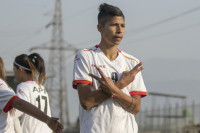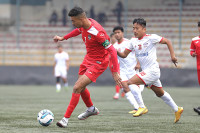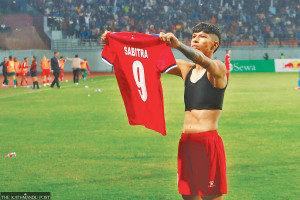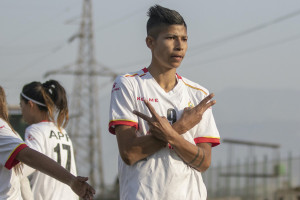Football
ANFA disables Facebook comments amid growing criticism. Experts raise accountability concerns
The national football governing body restricts comments citing abusive language, but promises to reopen soon. Digital rights activists say the move undermines transparency and accountability.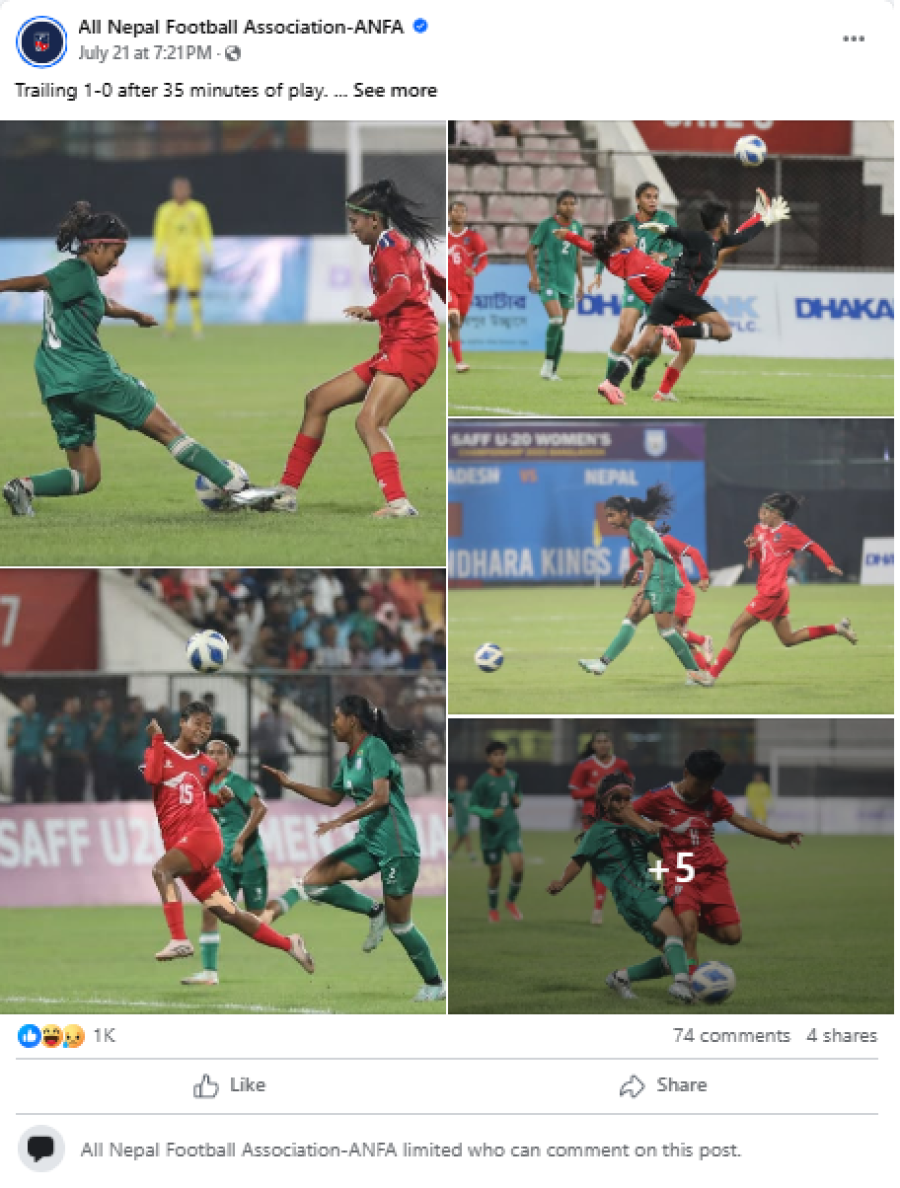
Nayak Paudel
At 7:21pm on Monday, as Nepal trailed Bangladesh 0-1 in the final game of the SAFF U20 Women’s Championship, the All Nepal Football Association posted an update on its official Facebook page: “Trailing 1-0 after 35 minutes of play.”
Minutes later, the country’s football governing body disabled the comment section. The censorship didn’t stop there—subsequent posts followed suit.
By that time, the post had already gathered 74 comments, ranging from motivational messages—urging the team to fight back—to harsh criticism and personal attacks directed at players, coaches, and ANFA officials.
According to ANFA officials, the decision to disable comments was prompted by a surge in inflammatory and disruptive messages that, in their words, were “damaging the atmosphere” around the game.
“When users start hurling abusive words at players and team members, it doesn’t help anyone,” said ANFA spokesperson Suresh Shah. “It harms the very individuals who are representing the nation.”
Some of the comments on ANFA’s Facebook posts are indeed too vulgar to be repeated. However, many others offer thoughtful feedback and constructive suggestions—input that, if taken seriously, could genuinely help Nepali football move forward.
“We need foreign coach,” wrote Nabin Gurung, one of the 74 commenters on the now-restricted post. “Our sisters seem to be really struggling, stamina is low, ball control isn't there, and instead of attacking, they just keep waiting. Other teams look sharper and more prepared than us; it felt like they could score any time. Today, the Bangladeshi team is really outplaying us. They [Nepal] do have potential, but there’s still a long way to go and lots of improvement needed.”
ANFA President Pankaj Bikram Nembang, in his message on ANFA Strategic Plan 2023-2030, vows to keep football fans and community aware about the latest information of the game, which they are passionate about.
“For that reason, we will publish every single news and information about the footballing activities on our website while also engaging fans through our social media channels,” the President’s Message section reads. “Our 12th man on the field—our fans—have the right to know every single detail about their team and players and they will have statistics from every competition at their disposal.”
However, ANFA’s recent decision to disable public comments on its social media posts appears to contradict that very commitment to transparency and fan engagement, digital rights activists say. When a public entity like ANFA disables comments, they add, it risks silencing genuine fans and restricting their ability to share feedback, voice concerns, or engage in meaningful dialogue.
“The public always has the right to be critical about public entities,” said Babu Ram Aryal, chair of Digital Freedom Coalition, an association of organisations working in the area of digital freedom, cybersecurity, digital resilience and internet governance in Nepal.
“Completely restricting the public from expressing their opinions signals that the public body does not want to be held accountable. It certainly does not reflect well on their image.”
Aryal, who also led and coordinated consultations for drafting the ICT Bill, 2018, and Cyber Crime Bill, 2018, at various levels, suggested that ANFA should rather focus on moderating comments rather than violating the right to free speech.
“If comments violate community standards or the country’s laws, they should be moderated,” Aryal told the Post. “There are often individuals who misuse social media to spread negativity, but denying genuine members of the public the opportunity to express their views because of this is not a wise move.”
While ANFA has restricted comments on its Facebook posts, its Instagram and X (formerly Twitter) accounts remain open to public interaction. These social media handles are also receiving similar dissatisfied comments recently.
Meanwhile, frustrated supporters have begun voicing their displeasure through the Facebook page’s ‘reviews’ section and by commenting on older posts where the comment sections remain active.
ANFA continues to limit comments on most new posts—except for live videos of the ongoing ANFA U16 Youth League—raising concerns among fans about how long the measure will last.
ANFA officials say the move is not intended to be permanent.
“We do not plan to continue denying fans their rights to free speech,” said ANFA spokesperson Shah. “We are working to find proper solutions to prevent negativity that directly or indirectly affects Nepali football. The comment sections will be reopened soon.”
FIFA also takes online abuse seriously. The international governing body of football has implemented ‘FIFA Social Media Protection Service’ to protect players, teams and officials from online abuse.
The service helps monitor, moderate and report such comments.
FIFA is also offering all its member associations year-round access to the moderation element of the service, ensuring protective measures are offered to teams regardless of whether they qualify for FIFA tournaments or not.
“FIFA will support member associations and local jurisdictional law authorities in taking real-world action against those who send abuse online, and will assess how it can restrict offenders from purchasing tickets to FIFA World Cup 2026,” FIFA states.
Yet, nowhere does FIFA recommend shutting down comment sections altogether—an act that risks alienating genuine fans and silencing healthy engagement in the sport.
The wave of criticism—ranging from sharp disapproval to abusive language—against ANFA has surged since Belgian national Patrick De Wilde, who coached Nepal’s women’s team at the recent Asian Cup Qualifiers in Uzbekistan, spoke out about mismanagement, internal politics, and interference by the football body in an interview with the Post.
Silencing criticism may offer temporary comfort, but it muffles the passion, feedback, and accountability that keep the soul of football alive. As Aryal, the digital rights activist, says, “It is also against the norms of good governance.”




 8.85°C Kathmandu
8.85°C Kathmandu
